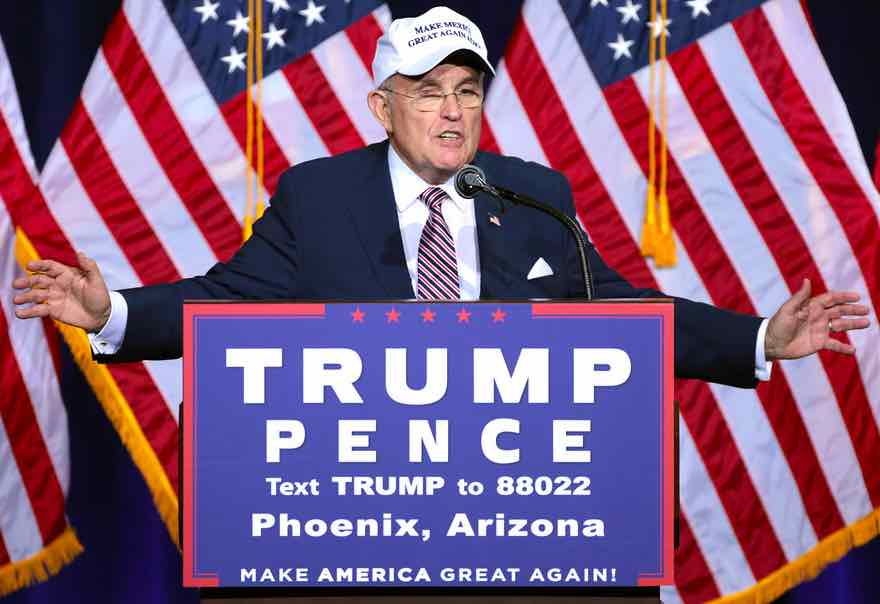
The latest Trump administration news is a Washington Post article reporting that Trump’s “personal lawyer” Rudy Giuliani, was working a private “back channel” negotiation this past year with embattled Venezuelan President Nicolás Maduro in a failed effort to persuade Maduro to quit his office and leave the country.
The Post, and some of the congressional Democrats who are always salivating at opportunities to raise further impeachment issues with which to charge President Trump, are claiming that in so doing while official US policy was to drive Maduro out of office through a military coup, a civil war, or even an assassination, was a potential violation of the Logan Act, a hoary statute passed back in antebellum Washington, which has never actually been used against anyone.
That act states that “any citizen of the US” who attempts to “influence” a foreign government or “any officer of a foreign government” in “relation to any disputes or controversies with the US” or to “defeat the measures of the United States,” shall be “fined or imprisoned not more than three years.”
That law has Democrats salivating since locking Giuliani in jail would be the best way to convince the alcohol-addled former Mayor of New York to “sing” about his actions on behalf of the president — the issue that led to the two impeachment articles already on the books.
The problem is that, as with much of the anti-Russian attacks leveled against President Trump, Democratic legislators are so caught up in a bizarre Cold War 2.0 mentality that they don’t realize the real crime is trying to criminalize what would, in a saner world, seem like a wiser course of action.
Compared to Giuliani’s alleged effort to ease Maduro out of office without violence, the policy being pursued at the time by Trump’s National Security Advisor John Bolton, of promoting a military coup against Maduro, installing a no-name US puppet named Juan Guaidó, and driving Maduro out of power or perhaps even killing the country’s elected leader seems like the work of a psychopath. Bolton made no secret of his and, under his authority, the US government’s efforts in trying to persuade Venezuelan military leaders to mutiny, or to encourage government soldiers and disaffected citizens to engage in sedition, perhaps attacking Venezuelan government and loyalist troops from the sanctuaries in neighboring Bolivia. The US also, under Bolton’s leadership of the NSC, was blocking Venezuelan oil sales, stopping tankers and using the US’s control of the international banking system to prevent Venezuela from receiving payment for shipments that made it through to customers in Europe and elsewhere. The idea has, for some time now, been to starve Venezuela into a state of rebellion.
These are acts of war, and had they been successful, Venezuela today would be mired in a brutal civil war, with Russia backing Maduro and the Venezuelan military, and opponents of the country’s president fighting, with smuggled US arms and perhaps even US air support (some of which were found inside trucks of purported food supplies the US tried to send into Venezuela last spring). The carnage of such a civil war, not to mention environmental destruction it would have wrought in a country with more oil wells than Saudi Arabia, would have been incalculable.
Fortunately for Venezuela and the world, the majority of Venezuelan people and the country’s military have stood fast behind their elected president, and Guaidó, the imposter promoted as the country’s “legitimate leader” by the US, is now a laughing stock.
The real crime that Congress and the US media should be investigating is Bolton’s illegal actions earlier this year in trying to subvert the elected democratic government of Venezuela. The reality is that this is what the US has been constantly trying to do under three and perhaps four successive presidents since 1999. That was the year when a charismatic former Venezuelan military officer, Hugo Chavez, won the presidency and launched what he called a “Bolivarian Revolution” to nationalize the country’s huge oil industry and to use the profits of its natural resource for the benefit of the country’s long-suffering and ignored poor instead of for the investors and managers of the global oil industry.
We are constantly told in the media that “Chavismo,” the term for the progressive policies of Hugo Chavez and his chosen successor Maduro, is an object lesson on the failure of socialism. Actually the difficulties plaguing the people of Venezuela are the result of two things having nothing to do with Chavez and Maduro and their policies. One has been the crash in oil prices, which for a time were up above $100 a barrel, but which plunged into the $30-40 range during the fiscal crisis and haven’t risen above $61/barrel since then. The other has been decades of subversion and embargoes by the US.
Fortunately, the resilient people of Venezuela have stood up to these incredible pressures, and have kept their Bolivarian Revolution alive and their democracy intact.
